Dolly
Parton
Dolly Parton turned success as a country songwriter and singer into not only pop music stardom but also work as an actor, a successful businesswoman, and a philanthropist.

-
Inducted1999
-
Born
January 19, 1946
-
Birthplace
Locust Ridge, Tennessee
Dolly Parton: Journey of a Seeker Exhibit Now Open
The Country Music Hall of Fame and Museum explores the life and career of Country Music Hall of Fame member Dolly Parton in a new exhibition, Dolly Parton: Journey of a Seeker. The exhibit will focus on turning points throughout Parton’s more than 60-year career where she overcame obstacles and ignored naysayers to become one of the most beloved and widely recognized celebrities across the world. The exhibit will be open from May 20 until Sept. 2026.
Photo © Jim Herrington

Dolly Parton turned success as a country songwriter and singer into not only pop music stardom but also work as an actor, a successful businesswoman, and a philanthropist.
With their strong feminine stances in the 1960s and 1970s, Parton and fellow pioneers Loretta Lynn and Tammy Wynette revolutionized the world of country music for women performers. Then Parton took her crusade a step further by crossing over to the pop world—landing on the cover of Rolling Stone, achieving pop hits, and starring in a series of Hollywood movies.
Along the way, Parton lost much of her core country audience, to the point that she dissolved her fan club, which had been one of the staunchest in country music, in 1997. But her career—and her appeal to fans of hard country—was far from over. Beginning in 1999, she returned to the music of her youth and began rebuilding a tradition-minded fan base with a series of critically acclaimed bluegrass albums.
Tennessee Mountain Home
Dolly Rebecca Parton was born into a large family, the fourth of twelve children, on January 19, 1946, in Locust Ridge, Tennessee. She came from deep in Appalachia, where music was an integral part of life for those who, like the Partons, struggled to make a hard living. Her mother was a singer who taught Dolly both church music and the Elizabethan ballads her ancestors brought to America. Dolly’s grandfather was a fiddling preacher who wrote “Singing His Praise,” which was recorded by Kitty Wells. Several of Dolly’s eleven siblings have been active in music, and some worked for a time in her family band.
Parton’s childhood figured strongly in her ambition to escape her circumstances and in the many frank, unromantic songs she wrote about her experience and life in Appalachia. For example, 1971’s “Coat of Many Colors” (#4 country hit) was a straight-ahead account of a humiliating experience Parton suffered at school when classmates made fun of her homemade patchwork coat.
Songs
00:00 / 00:00
00:00 / 00:00
00:00 / 00:00
Getting Her Start
Parton was encouraged in her tentative attempts at music by her uncle Bill Owens, who bought her a guitar and, by the time Parton was ten years old, landed her a stint on a television variety show in the nearest big town, Knoxville. Nashville soon took note of Parton, and she made her first guest appearance on the Grand Ole Opry at age thirteen in 1959. She also recorded a single for a small Louisiana label, and one for Mercury Records in Nashville in 1962.
Parton was not daunted by the lack of success of her early recordings, so in 1964 she packed her bags and left for Nashville immediately after graduating from high school. Her first day in town, she met her future husband, contractor Carl Dean, in a laundromat.
Parton’s music career progressed apace; people began to take note of her as a songwriter, especially after a pair of songs she wrote with Owens became Top Ten hits for Bill Phillips in 1966. Then she recorded for Fred Foster’s Monument Records from 1965 to 1967, and “Dumb Blonde”—which attacked traditional female stereotypes—became her first Top Forty hit.
Hello, Dolly
Parton’s pivotal career moment came in 1967, in the form of a phone call from the syndicated television series The Porter Wagoner Show, whose flashy-dressing, traditional country–singing host was looking to replace his duet partner, Norma Jean. As a team, Wagoner and Parton became immediate audience favorites. Her hourglass figure, outrageous outfits, and angelic voice played perfectly against Wagoner’s cornpone humor and old-fashioned country sensibility. RCA Records signed Parton as both Wagoner’s duet partner and a solo recording artist, and she became increasingly successful in both personas, soon beginning to eclipse Wagoner’s own star.
Parton’s first solo #1 hit was her composition “Joshua” (1971), which led to three more #1 songs in 1974: “Jolene,” “Love Is Like a Butterfly,” and “I Will Always Love You.” That the latter song was her own personal farewell to partner Wagoner became painfully evident to him when she left his TV show that year. Under contractual obligations, he continued to produce her records (including the #1 hit “The Bargain Store” in 1975) until 1976, but she was soon on her own.
In retrospect, the early- to mid-1970s was the most creatively fertile period of Parton’s country music career. She was voted the Country Music Association’s Female Vocalist of the Year in both 1975 and 1976. Additionally, 1973 yielded what has come to be regarded by some as her most nearly perfect album, My Tennessee Mountain Home, a bittersweet look back at a life and a tradition she was determined to leave behind. The album’s cover is a picture of the cabin in which she grew up in Sevierville; the songs, especially the title cut, are matter-of-fact tributes to a people and a way of life that are vanishing. “I wanted to be free. I had my songs to sing, I had an ambition and it burned inside me. It was something I knew would take me out of the mountains. I knew I could see worlds beyond the Smoky Mountains,” Parton told Rolling Stone in 1977.
Videos
“Dumb Blonde”
The Porter Wagoner Show, 1967
“Islands in the Stream” with Kenny Rogers
Country Music Association Awards, 1983
Dolly Parton’s first solo #1 hit was her composition “Joshua” (1971), which led to three more #1 songs in 1974: “Jolene,” “Love Is Like a Butterfly,” and “I Will Always Love You.”
Photos
-
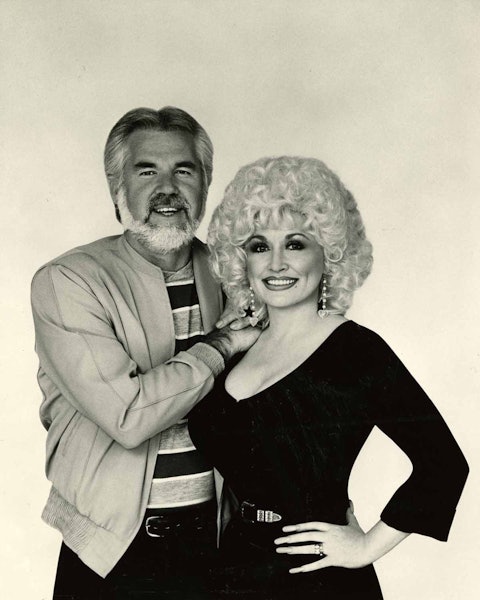
Dolly Parton and Kenny Rogers. Photo by Walden S. Fabry Studios.
-
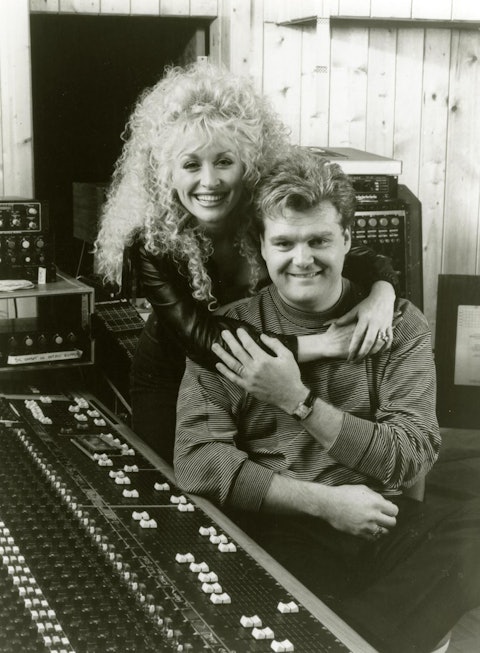
Dolly Parton and Ricky Skaggs in the studio recording her album 1989 album White Limozeen, which Skaggs produced.
-
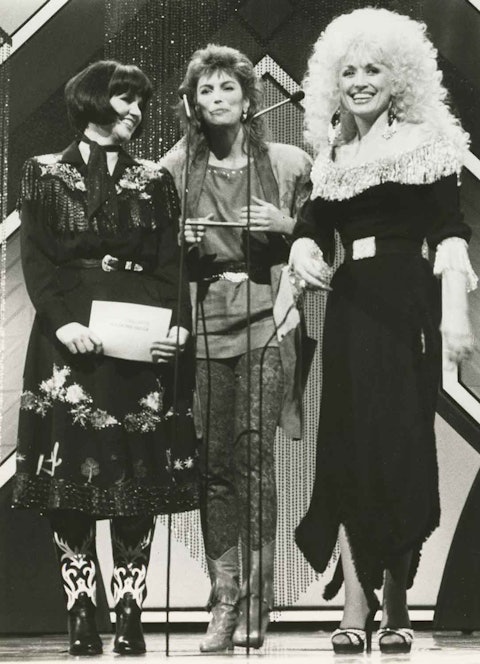
From left: Linda Ronstadt, Emmylou Harris, and Dolly Parton at the Country Music Association Awards, 1986. Photo by Alan L. Mayor.
-
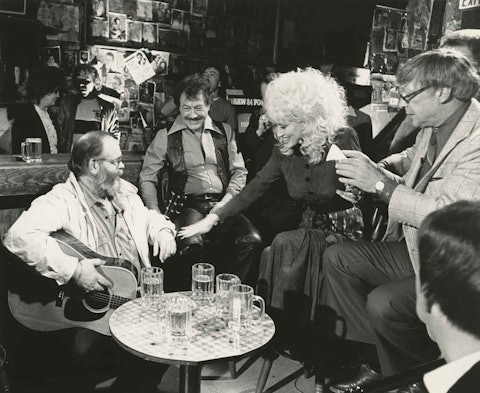
From left: Johnny Russell; Bill Owens, Dolly Parton’s uncle; Dolly Parton; and Fred Foster, at Tootsie’s Orchid Lounge in Nashville for a taping of Parton’s ABC-TV show Dolly, 1987.
-
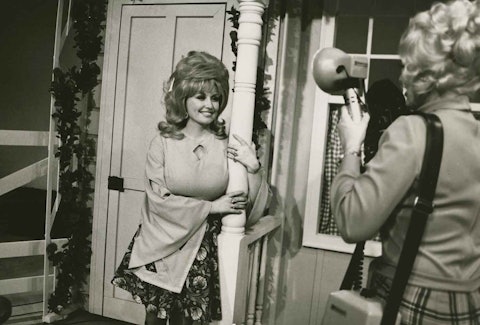
Dolly Parton on the set of The Porter Wagoner Show, 1972. Photo by Hope Powell.
-
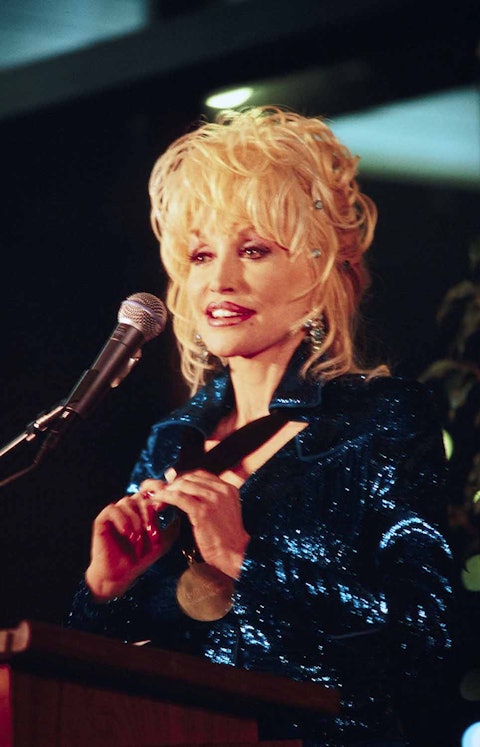
Dolly Parton at her Country Music Hall of Fame induction, 1999. Photo by Raeanne Rubenstein.
-
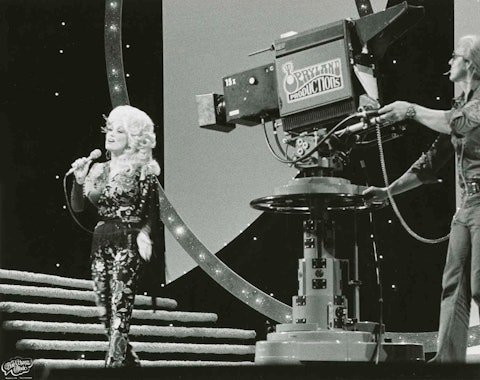
Dolly Parton performs at the Country Music Association Awards, 1977. Photo by Bob Schanz.
-
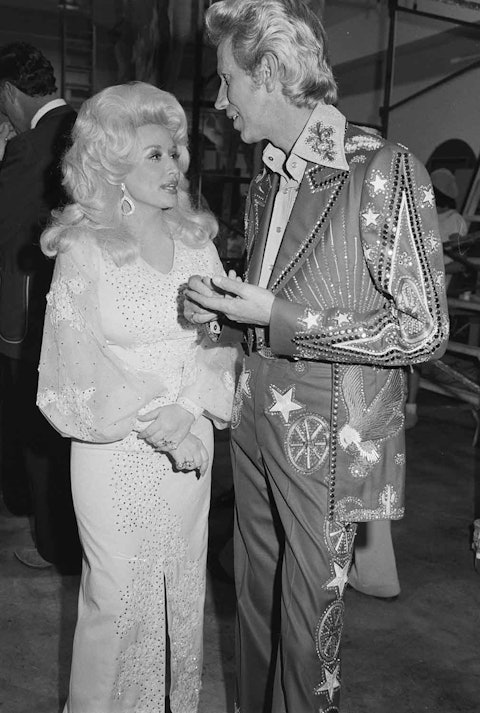
Dolly Parton and Porter Wagoner backstage at the Country Music Association Awards, 1975. Photo by Raeanne Rubenstein.
-
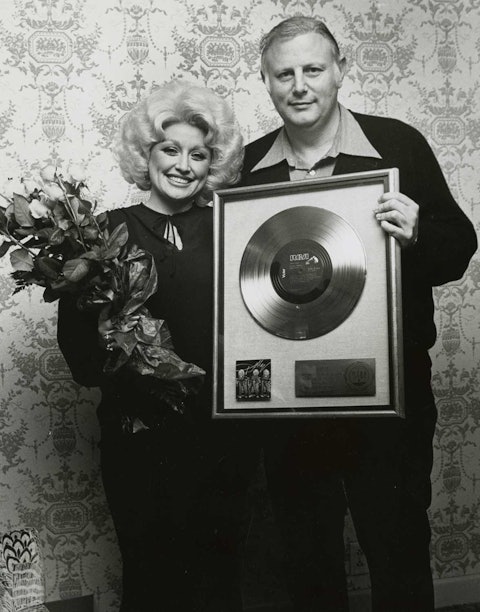
Dolly Parton and Jerry Bradley hold a plaque commemorating the Recording Industry Association of America certifying Parton’s Here You Come Again album platinum, for sales of one million, 1977.
-
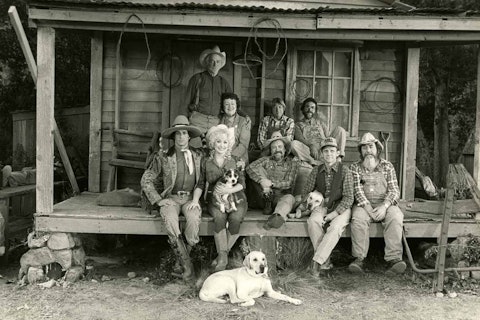
Dolly Parton (front row, second from left) on the set of the movie Rhinestone, 1984. Sylvester Stallone sits to the left of Parton. Photo by Walden S. Fabry Studios.
Hello, Hollywood (and Dollywood)
Parton’s new life looked beyond Nashville and increasingly upon Hollywood. Her first album after declaring her independence from Wagoner was 1977’s New Harvest, First Gathering, which yielded the #11 single “Light of a Clear Blue Morning.” That same year brought the album Here You Come Again, a glitzy—and successful—attempt at a country-to-pop crossover. The CMA named Parton Entertainer of the Year in 1978, and it seemed as if she could preserve the best of both worlds.
However, Parton put less emphasis on her country career immediately after that, even as her name became a household word and she became a constant presence on network TV: on talk shows, specials, and a brief, self-titled series of her own in 1976. Her movie career bounced from stellar (9 to 5) to forgettable (Rhinestone, which attempted to make Sylvester Stallone a believable country singer). Her recording triumphs included 1987’s Trio with Emmylou Harris and Linda Ronstadt and a 1993 collaboration, Honky Tonk Angels, with Loretta Lynn and Tammy Wynette. In 1992, the singer Whitney Houston recorded Parton’s “I Will Always Love You,” which became a #1 smash hit in the pop market, partly due to its inclusion in the soundtrack for the movie The Bodyguard.
Parton has also demonstrated her business acumen in several ventures, most notably the theme park Dollywood in East Tennessee, near Sevierville. In 1985, she and other investors opened the park, which has become one of the South’s leading tourist attractions. Through Dollywood and the non-profit Dollywood Foundation, Parton has contributed in many ways to her home county’s economy and to scholarship programs for high school students there. Her Imagination Library, which gives one free book a month to children from birth to age five, has distributed more than 178 million books and expanded from East Tennessee to towns across the United States and into England and Australia. She also supports the Dolly Parton Center for Women’s Services in Sevierville, and there is now a life-size statue of Parton on the lawn of the Sevier County courthouse.
Back to Her Roots
In 1996, Parton cut Treasures, an album of favorites (non-Parton songs), for the new Nashville recording label Rising Tide Entertainment. It was a critical success but did not fare well commercially. That same year, however, she and Vince Gill won the CMA’s Vocal Event of the Year award for their duet recording of “I Will Always Love You.”
Parton, Harris, and Ronstadt joined forces again for Trio II in 1999, and the supergroup’s rendition of Neil Young’s “After the Gold Rush” won a Grammy for Best Country Collaboration with Vocals. That year also found Parton coming full circle to the music she grew up hearing: she released her first bluegrass album for Sugar Hill, The Grass Is Blue. It was named Album of the Year by the International Bluegrass Music Association and won a Grammy for Best Bluegrass Album. Two additional bluegrass albums, Little Sparrow (2001) and Halos and Horns (2002), followed, and in 2003 Sugar Hill released Just Because I’m a Woman: Songs of Dolly Parton, a tribute album featuring tracks from Norah Jones, Sinead O’Connor, Alison Krauss, and Shania Twain, among others.
Parton founded her own record label, Dolly Records, in 2007. Two years later, the 9 to 5 musical debuted on Broadway. Parton wrote the production’s music and lyrics and was nominated for the Best Original Score Tony award for her work.
In 2004, the Library of Congress presented Parton with the Living Legend Award for her contributions to the United States’ cultural landscape. In 2005, she received the National Medal of Arts, the highest award given to artists by the U.S. government; a year later, she received the prestigious Kennedy Center Honors.
Parton joined the Nashville Songwriters Hall of Fame in 1986 and the Songwriters Hall of Fame in 2001. The Recording Academy honored her with a Lifetime Achievement Award in 2011. In 2022, she was inducted into the Rock & Roll Hall of Fame. She has also won thirteen ACMs, ten Grammys, and nine CMAs as of April 2022.
—Chet Flippo
Adapted from the Country Music Hall of Fame® and Museum’s Encyclopedia of Country Music, published by Oxford University Press



